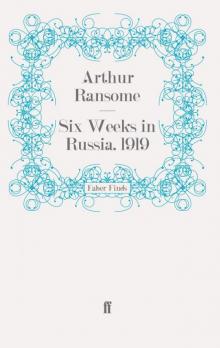- Home
- Arthur Ransome
The Picts and the Martyrs
The Picts and the Martyrs Read online
CONTENTS
Cover
Title Page
Map
Illustrations
Dedication
Note
I. VISITORS EXPECTED
II. THE VISITORS ARRIVE
III. OUT OF THE BLUE
IV. THE DOGS’ HOME
V. TRANSFORMATION SCENES
VI. “SHE’S HERE!”
VII. SECONDHAND NEWS
VIII. DEALING WITH THE DOCTOR
IX. HARBOUR FOR SCARAB
X. PIGEONS FOR TIMOTHY
XI. “A BETTER PICT THAN EITHER OF US”
XII. A SIGNAL FROM THE LAWN
XIII. TICKLING TROUT
XIV. “THEY CAN’T BE GOING TO SAIL …”
XV. LAUNCHING THE SCARAB
XVI. ON THEIR OWN
XVII. WAITING FOR THE MESSAGE
XVIII. VISITING SEAL
XIX. “WE’VE NEVER BEEN BURGLARS BEFORE”
XX. POLICE!
XXI. AS OTHERS SEE US
XXII. PLANS AND CHANGE OF PLANS
XXIII. THE GREAT AUNT GOES TO SEE FOR HERSELF
XXIV. CARE-FREE HOLIDAY
XXV. TOTALLY DISAPPEARED
XXVI. THE HUNT IS UP
XXVII. THE ONE THING THAT MUSTN’T HAPPEN
XXVIII. THREE IN A BOAT
XXIX. GREAT AUNT MARIA FACES HER PURSUERS
XXX. REWARD OF VIRTUE
About the Author
Also by Arthur Ransome
The Arthur Ransome Society
The Arthur Ransome Trust
Copyright
ILLUSTRATIONS
THE PICTS AT HOME
“NOT WHAT I CALL HOMELY”
A GREAT IMPROVEMENT TO THE HOUSE
“IT HASN’T TUMBLED DOWN YET”
MOVING HOUSE
MAP
WET WORK IN THE LAGOON
NOT LOOKING AT ALL LIKE GOING
LOOK-OUT POST ON THE RIDGE
FEELING FOR A TROUT
SCARAB
HOW NOT TO LOWER SAIL
WET AND PIEBALD IN THE DOORWAY
GETTING IN
WORK IN THE HOUSEBOAT
THEIR OWN MINE
AT THE BECKFOOT GATE
THEY WERE STARTLED BY A SPLASH
“IT ACTS AS AN EXTRA SAIL”
THE GREAT AUNT STEPS ASHORE
TO
AUNT HELEN
C.F.C.A.
PLUS 100. I
(These letters mean Certificated First Class Aunt.
There are Aunts of all kinds, and all the good ones should be given certificates by their nephews and nieces to distinguish them from Uncertificated Aunts, like Nancy’s and Peggy’s G.A.)
NOTE:
I think you ought to say it was all hands to the ink with some of these pictures.
NANCY BLACKETT, CAPT.
THE PICTS AT HOME
CHAPTER I
VISITORS EXPECTED
“IT’S not what I call homely,” said the old Cook, standing in the doorway of the spare bedroom at Beckfoot and looking at an enormous skull and crossbones done in black and white paint on two huge sheets of paper and fixed with drawing pins on the wall above the head of the bed.
“Dot’ll think it’s just right,” said Nancy, who was kneeling on the pillows putting a last touch to one of the bones.
“A death’s head like that to watch her go to sleep. And she won’t like that yellow and black thing either,” said Cook, looking at the two flags on little flagstaffs fixed at the foot of the bed. “Isn’t that what you had out of the window when your face was swollen up with the mumps?”
“It’s the L flag,” said Nancy, leaning back to get a good look at her work. “It does mean leprosy and plague and things like that, but it’s the only one we’ve got handy that’s the right size. She won’t mind.”
“And that inseck. It’s enough to make her think the bed’s alive. I don’t know where you’ve seen such things. Not in this house anyway. …”
“It’s a scarab,” said Nancy.
“More like a bug,” said Cook.
“Well, it is a bug really, a sort of bug … It’s a beetle thousands of years old. A sacred beetle. Egyptian. It’s the flag for their new boat.”
“I don’t know what your mother’ll say when she comes back and sees it. And your uncle’s room with a death’s head, too. Nice way to welcome visitors, it seems to me.”
“It all depends on the visitors,” said Nancy, scrambling off the bed and joining Cook in the doorway to get a better view. “Yes. I think we’ll have another skull and crossbones at the foot of the bed. It looks a bit tame without. Hi! Peggy! More paper. I’m going to do another skull for Dorothea and another for Dick as well.”
“So long as you don’t drop paint on the carpet,” said Cook.
“I won’t. That was only one spot on the pillow. Accident. We’ll do the rest of the painting in the garden. All right, Cookie, darling, we’ve promised Mother we’re going to be almost sickeningly good. You’ll see. Haven’t we been good so far?”
“Well, I must say, Miss Ruth, you haven’t had much time. …”
“Jibbooms, bobstays and battleaxes,” exclaimed Nancy. “If you call me Ruth again …”
“All right, Miss Nancy … though Ruth’s a nice name, I must say.”
“Not for a pirate,” said Nancy. “And you know the only person who calls me Ruth now is the Great Aunt, and she doesn’t count. She even calls Peggy, Margaret.”
“I don’t what you might say see eye to eye with your Aunt Maria,” said Cook.
“We none of us do,” said Nancy. “Not even Mother or Uncle Jim.”
“Well, Miss Nancy,” said Cook. “With you doing the housekeeping, if you can take your mind off them death’s heads, you’d best be coming into the kitchen like your mother to talk to me about the day’s meals. There’s that bit of roast mutton, cold. There’s the brawn, and I was thinking of a treacle pudding. …”
“NOT WHAT I CALL HOMELY”
“Oh bother,” said Nancy. “I won’t start housekeeping till tomorrow. Ask Peggy. Or, you do just as you like. Only no tapioca. Or sago. Never. We can’t stand them and I expect Dick and Dot hate them just as much as we do.”
Peggy came across the landing with paper for more skulls and crossbones.
“Here you are,” she said. “Come and look at Dick’s room. The skull and crossbones looks fine over Uncle Jim’s bed. I wonder he never thought of it himself. And I’ve put the big telescope on the table by the window. Dick’ll feel at home right away.”
“You will do the painting in the garden, won’t you?” said Cook. “I’ll have to put on a new pillowslip as it is.”
“No need,” said Nancy. “Dot won’t mind. I’ll tell her it’s a drop of blood gone black.”
“She won’t thank you,” said Cook and went off downstairs to her kitchen.
*
Influenza was the reason that Nancy and Peggy were alone with Cook at Beckfoot. Examination papers was the reason that they were expecting Dick and Dorothea Callum to join them. Mrs Blackett had had influenza very badly and had been ordered to go away for a complete rest. Her brother Jim, generally known as Captain Flint, had taken her off for a sea voyage and a cruise round the coasts of Scandinavia. It meant being away for the first ten days of the summer holidays and Mrs Blackett at first had refused even to think of it. But Captain Flint had pointed out that that was much better than spoiling the whole holidays by having a breakdown and in the end she had agreed that it would not do Nancy and Peggy any harm to manage by themselves at Beckfoot. “Jolly good for them to have a chance,” Captain Flint had said. “And old Cook’ll see they’re properly fed, and Timothy Stedding’ll be
hanging on in the houseboat and going to and fro to the mine. He’s got a job to do in my den. He’ll be looking in on them every other day. They’ll be right as rain.” Then had come the news that Dick and Dorothea Callum could not be taken in at Dixon’s Farm, because it was full up with other visitors, and Professor Callum had to be busy for a fortnight in London correcting examination papers. So Mrs Blackett had invited Dick and Dorothea to join Nancy and Peggy. “Dick’s a sensible chap,” said Captain Flint, “and Dorothea’s got some sort of head on her shoulders. They’ll be ballast for the party even if they are a bit younger, and that young Dick can give Timothy a hand.” Before leaving, Mrs Blackett had visited Nancy and Peggy at their school. “No wildnesses,” she had said doubtingly. “If I thought there was any risk of your getting into trouble, I’d much rather stay at home. I don’t know what Aunt Maria would say if she knew I was leaving you alone.” “As tame as tame can be,” Nancy had promised. “You go off and get well. We’ll be so jolly good nobody’ll know us. And then, when you come back, we’ll have a lot of wildness stored up, and we’ll fairly take it out of Uncle Jim.” And now they were back from school and looking forward to being model hostesses. Not one single thing was to be allowed to happen that would make their mother wish she had not trusted them to run the house themselves.
*
They came in to their midday dinner, leaving the two new specimens of skull and crossbones spread on the lawn, with stones to keep them from blowing away, while they dried in the hot August sunshine. They were talking of the boat which Professor Callum had asked their uncle to order for Dick and Dorothea, and were hoping it was ready so that its crew could get the hang of it before the Swallows turned up, who were coming in a fortnight’s time to stay at Holly Howe on the other side of the lake.
“Timothy said yesterday he didn’t think it would be done by today,” said Peggy.
“We’ll go and look at it on the way from the station,” said Nancy.
“They’ll be bursting to see it,” said Peggy. “I say, Nancy, is a boat she or it before it’s launched?”
Nancy never answered. The telephone bell was ringing in the hall.
“Who’s that?”
“Somebody for Cook, probably. Butcher, perhaps.”
They heard a clatter as Cook put down the pudding dish on the table in the hall. Then they heard her at the telephone. “Hullo … Hullo … Telegram, did you say? … Eh? … Mrs Blackett is away … Miss Ruth Blackett … Wait a minute … Hold on, please. I’ll call her …”
Nancy had already jumped up from her chair.
“It’s a telegram for you, Miss Ruth …”
Even in that moment, Nancy shook her fist at Cook.
“Miss Ruth Blackett,” said Cook firmly. “That’s what they said.”
Nancy was already at the telephone in the hall.
“Yes … Peggy, don’t make such a row with your hoofs! … I can’t hear … Wait a minute while I get a pencil … Hi! … Pencil! Peggy! … All right now … Ready … Go on … Reply paid … I heard that … Never mind about the address … ‘Are … you … alone … at … Beckfoot … when … does … your … mother … return … Maria … Turner …’ Gosh! Sorry. Nothing. I was talking to somebody else. Yes … That’s all right. I’ll send the answer in a minute or two. Thank you.” She hung up the receiver. “Gosh!” she said again. “Giminy! It’s the Great Aunt. She’s found out about Mother being away.”
“What business is it of hers?” said Cook. “You come along and eat your pudding. No call for you to get worried. Miss Turner’s far enough from here. And she can’t stop your mother now.”
“We’ve got to send an answer,” said Nancy. “It was reply paid.”
“Time enough for that,” said Cook.
Nancy, while eating her pudding, scribbled between mouthfuls. She covered a sheet of notepaper with possible telegrams, not one of which seemed fit to send. “The main thing is to quiet her down,” she said. “How can we squash her in twelve words?”
“We can’t,” said Peggy.
“We couldn’t in twelve thousand,” said Nancy. “But we’ve got to do something. Don’t you see? It’s Mother she’s getting at, not us. ‘Are you alone at Beckfoot?’ She’s prickly with disapproval.”
“We aren’t alone,” said Peggy. “Tell her Cook’s here.”
“Twelve words,” said Nancy. “And the address takes four. That’s eight for what we’ve got to say.” She crossed out a few words on her last draft, added three more, and read the result. “No. Cook is here. Mother comes back thirteenth. Nancy.”
“You could say ‘returns’ instead of ‘comes back’,” said Peggy. “And, I say, won’t you have to sign it ‘Ruth’ for the G.A.?”
Nancy made a face, crossed out “Nancy,” wrote “Ruth” with an angry pencil, and saved a word by using “returns”.
Peggy read it. “She’ll think it means we are alone. She’ll read ‘No cook is here,’ because of their never bothering to put in stops. She’ll think it means ‘Not even Cook’.”
“Shiver my timbers!” said Nancy, and altered the telegram again. “Not alone. Cook here. Mother returns thirteenth. Ruth.” “Ugh! Ruth! That makes twelve words with the address.”
She showed the telegram to Cook.
Cook read it aloud, word by word. “You ought to tell her there’s nowt amiss,” she said.
“Extra words,” said Nancy. “But perhaps I’d better. After ‘Cook here,’ I’ll put in ‘Everything scrumptious’.”
“Slang,” said Peggy, doubtfully. “She won’t like that.”
“Everything splendid,” said Nancy. “She won’t really like that either. I’ll just put ‘All very well.’ Three words. Only threepence anyhow. Worth it. And it’ll be in the telephone account. Mother won’t mind.”
She went to the telephone with Peggy and Cook, neither of whom could think of any improvements. She rang up the exchange, asked for “Telegrams”, gave the Beckfoot number, explained that this was the answer to the reply-paid telegram, gave Miss Turner’s address in Harrogate, and read out the final version:
“Not alone. Cook here. All very well. Mother returns thirteenth. Ruth.”
She waited while the telegraph clerk repeated the message, said that it was all right, and put down the receiver. She looked at Cook. “I hope it is all right,” she said. “Anyway, it’s the best we could do.”
“You can’t do better,” said Cook. “Eh, but I’d like a word with the meddlesome busybody that let Miss Turner know your mother was away.”
“She can’t do anything about it now,” said Nancy, “but I bet she’ll go and be beastly to Mother as soon as she comes back.”
“Mother’ll have had her holiday by then, so it won’t matter,” said Peggy. “At least not as much as if she’d got at her before she started.”
“Bother Aunt Maria,” said Nancy. “Keel haul her. Fry, frizzle and boil her.”
“You’ve sent your telegram now,” said Cook. “Best forget it. Time’s running on and we’ve enough to do with them two coming.”
“Giminy!” said Nancy. “It’s a good thing whoever told her Mother was away didn’t tell her we were going to have visitors.”
“They’ll be here before you’re ready for them,” said Cook. “One of you ought to run round to Mrs Lewthwaite’s to tell Billy he’ll be wanted to drive the car.”
“We’re not going to meet them in Rattletrap,” said Nancy. “They wouldn’t care twopence about driving round the head of the lake. They’ll want to sail across. And they’ll want to look at the new boat.”
“And what about their luggage?”
“They won’t bring much. We’ll get it down to the steamer pier in the bus.”
“And if there’s more than what you can carry?”
“Billy Lewthwaite can fetch it in Rattletrap tomorrow. Come on, Peggy. We haven’t finished the decorations yet. And we’ve got the boathouse to get ready for Scarab. And we didn’t finish Amazon’s rigging.”
“It won’t do for you to be late at the station,” said Cook.
“We aren’t going to be. Come on, Peggy. That black paint’ll be dry by now.”
CHAPTER II
THE VISITORS ARRIVE
WHILE Nancy and Peggy at Beckfoot were making ready for their visitors, the train for the north, flashing through all but the biggest stations, was bringing Dick and Dorothea. Dorothea had been seen off by her mother at Euston. Dick, coming straight from school, had joined the train at Crewe, after a frantic run along the platform before he had found the through carriage and seen Dorothea waving from a window. After the first few minutes of exchanging news, and rejoicing that they had been allowed to go north at once instead of having to waste the first fortnight of the holidays sweltering in London, Dick had opened his suitcase and taken out a thin blue book, Sailing, by E. F. Knight, on which he meant to put in some hard work during the journey.
“What are the other books?” asked Dorothea.
“Pocket Book of Birds,” said Dick, and “Common Objects of the Countryside …”
“Oh,” said Dorothea. “Nothing to read at all?”
“You really ought to read the sailing book, too,” said Dick. “Perhaps we’ll be launching Scarab tonight, and it’ll be awful to make mistakes with Nancy and Peggy watching.”
“I’m half way through The Sea Hawk,” said Dorothea.
“Telescope, compass, microscope, collecting box,” said Dick, making sure he had forgotten nothing that mattered.
“Are those all the clothes you’ve brought?” said Dorothea.
“I shan’t want any more,” said Dick, closing the suitcase and pushing it away under the seat. “And there wasn’t room anyhow. All the rest have gone home.”
“Have you had anything to eat? Mother told me to have lunch in the train.”
“I had mine at Crewe. I had thirty-seven minutes to wait before your train came in.”

 Peter Duck: A Treasure Hunt in the Caribbees
Peter Duck: A Treasure Hunt in the Caribbees Racundra's First Cruise
Racundra's First Cruise Great Northern?
Great Northern? Swallowdale
Swallowdale Swallows and Amazons
Swallows and Amazons Winter Holiday
Winter Holiday Missee Lee: The Swallows and Amazons in the China Seas
Missee Lee: The Swallows and Amazons in the China Seas Pigeon Post
Pigeon Post We Didn't Mean to Go to Sea
We Didn't Mean to Go to Sea The Firebird and Other Russian Fairy Tales
The Firebird and Other Russian Fairy Tales Coot Club
Coot Club The Big Six: A Novel
The Big Six: A Novel Six Weeks in Russia, 1919
Six Weeks in Russia, 1919 Secret Water
Secret Water The Big Six
The Big Six Missee Lee
Missee Lee Peter Duck
Peter Duck The Picts and the Martyrs
The Picts and the Martyrs